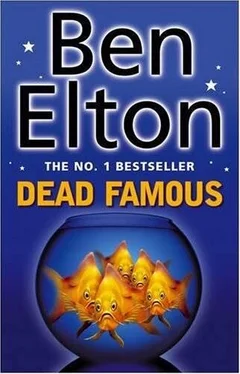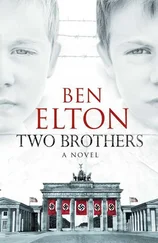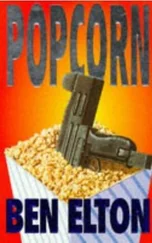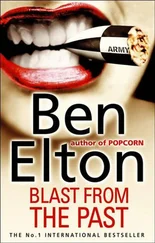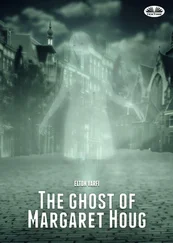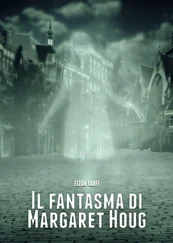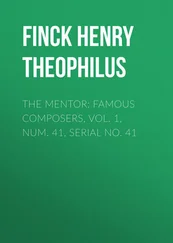In the end she had decided to risk it. It had only been a scuffle at an animal-rights protest, and Woggle looked like such a peaceful old hippie. Besides which, there were only hours left before the game started, and Woggle was potentially such very good telly that she simply could not face the idea of giving him up.
“We can always deny any knowledge of it if the cunt goes mad and bops someone for eating a ham sandwich,” Geraldine said to Bob Fogarty. “I mean, the cops and the press never caught him at the time, so why should we have recognized him now?”
So Geraldine had hidden the old clippings in a drawer and thought no more about them. Until day fifteen, when she found Peeping Tom in a situation where, having made a hero out of Woggle, she needed, as she said at the emergency planning meeting held in the small hours of the morning, “to get the cunt out sharpish”.
It did not take long for the photograph of Woggle kicking the teenage girl to find its way back to Peeping Tom Productions. Geraldine had sent it to the police at 9.15 a.m. with an accompanying letter explaining that she had received it at the office that morning from an anonymous source.
By 9.30 one of the press ringers at Scotland Yard had alerted the papers and by 9.45 they and the police had been beating a path to Peeping Tom’s door. Inside the house, knowing nothing of these developments, the mood was very sombre.
Woggle had spent the night under his blanket in his usual corner. The others had been drinking out in the garden until the chill had forced them in at around four. They all felt very sorry for themselves, Woggle because he had been assaulted and defiled, the others because their lovely exciting adventure was being ruined by Woggle.
When it came, relief for the eight and disaster for the one struck like a thunderclap.
“This is Chloe,” the tannoy announced. “Woggle, would you please gather up your things. You are to leave the house in ten minutes.”
Garry, Kerry and Jazz cheered, the others, ever mindful of the game that they were playing, masked their inner delight beneath thoughtful, sensitive faces.
Woggle popped his head out from under his blanket. “You can’t chuck me out, I haven’t been voted,” he said. “I know my rights and I’m not fucking going.”
“Woggle, this is Chloe. We are not chucking you out. The police wish to interview you. Get your things.”
There was stunned silence.
“Fucking hell, Woggle, what you done?” Garry asked.
“Nothing, bollocks, I’m not going. They’ll have to come and get me.”
And so they did, and that evening, in one of the television coups of the year, the nation watched as three uniformed police officers entered the Peeping Tom house and arrested Woggle for assault. Most of the other inmates were too stunned to react, but in what was without doubt a brilliant effort at audience manipulation Dervla suddenly cast herself in the roll of feisty, quick-thinking friend of the oppressed. She leapt up from the couch and gave Woggle the name of her solicitor.
“Insist on being allowed to look up the number in the book,” she said, allowing her Irish accent to ring out more strongly than usual, perhaps thinking it a fitting brogue in which to conduct a civil liberties protest. “If you call directory inquiries they’ll say you’ve used up your phone call. I know their tricks.”
David was not going to be upstaged. He stepped boldly in between the policemen and Woggle, who was still sitting on the floor.
“Be aware, officers, that I have committed all of your faces and your numbers to memory. I am an actor and am trained in the art of mental retention. If anything happens to Mr Woggle you shall answer to me.”
It sounded great, and it would have sounded even better if the leading copper had not brought David down to earth by pointing out that since the arrest was being recorded by six separate video cameras he did not think that there would ever be a problem identifying the arresting officers. Then the policeman turned to Woggle.
“Get up, please, sir.”
“No. I ain’t moving. I am the Peeping Tom One. Free the Peeping Tom One!”
“You can’t arrest him for having fleas,” said Dervla.
“Why not?” Garry interjected. “Should have done it weeks ago.”
Kelly stepped forward and put some apples and biscuits in Woggle’s lap. “In case they don’t feed you.”
“Oh, for God’s sake, Kelly,” David sneered. “Like you give a toss.”
“He’s a human being,” Kelly protested.
“That’s debatable,” said Jazz, who was over at the kitchen area putting the kettle on and trying to look cool and unconcerned. “I’m young, gifted and black,” his hip, easy stance was saying. “Coppers come through my door every day.” In fact Jazz had never been arrested in his life, but the pose looked great and his standing with the public rocketed.
“We are bearing witness to this arrest,” Dervla said firmly.
“Yes, we are,” Moon added, rather weakly.
Hamish clearly decided that he couldn’t compete and, following his plan that only the noticed get nominated, he got up and went into the boys’ bedroom for a lie-down.
“Sir,” the lead policeman said, “we do not know your name beyond the fact that you are known as Woggle. However, we have strong photographic evidence to suggest that you are the person wanted by Lincolnshire Police in connection with the serious assault of one Lucy Brannigan, a girl of fifteen at the time of the attack.”
The other inmates stopped in their tracks, stunned.
“What? Sexual assault?” Garry asked.
“Come along, sir,” said the policeman.
“I can’t believe it, Woggle,” said Jazz. “I knew you were a dirty disgusting little toe-rag, but I never thought you were a nonce.”
Everybody drew back from the little figure squatting in the corner. Dervla disengaged herself and disappeared into the girls’ bedroom.
Woggle wasn’t having this. “She was a fox-murderer!” he shouted. “An animal-torturer! It was a fair fight and I kicked her in the head. She bloody deserved it, the fascist! If you live by the sword you die by the sword.”
And as if to prove this point the policemen picked Woggle up and carried him away. As they took him, struggling, through the door the blanket fell away to reveal Woggle’s skinny body, still naked and covered in white flea powder.
He looked pathetic. It was the final indignity.
DAY THIRTY-FOUR. 11.50 p.m.
On the drive home Coleridge attempted to banish Woggle from his mind by listening to Radio 4. The thing about Radio 4 for Coleridge was that no matter what they were talking about he always got caught up in it. He had often found himself sitting in his car outside his house waiting to hear the end of some discussion about crop rotation in West Africa, or some other subject he had never heard of and would never think of again. Even the shipping forecasts made good listening, conjuring up as they did strange emotions and race memories of dark rocky coastlines, furious typhoons and the long lonely watches of the night.
The subject being discussed that night as Coleridge drove home was an economic slump in rural Ireland. The shift of money and young people to the cities, coupled with cuts in European agricultural grants, had left some villages in desperate financial straits. Negative loans and mortgages were forcing many households to the edge of despair. Coleridge’s ears pricked up at the mention of one of the villages worst affected, Ballymagoon. Where had he heard that name recently? he wondered.
It wasn’t until he was opening his second can of beer (and thinking about having a bit of ham with it) that Coleridge remembered. He had read the name on a suspect profile. Ballymagoon was the village in which Dervla was born.
Читать дальше
